虚拟语气倒装
虚拟语气倒装讲义
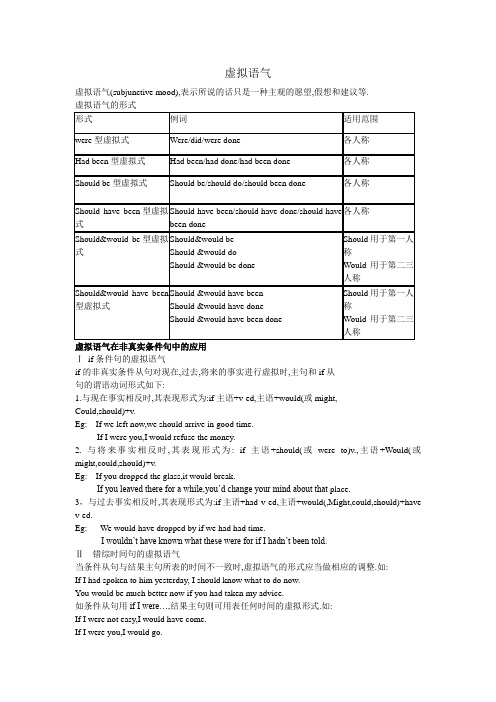
Ⅴ虚拟语气在in case,lest或for fear that等从句中的用法
in case,lest或for fear that引起的从句常用虚拟语气,表示“以防,以免”,形式为should+动词原形,should通常不能省略.
1.I finally got the job I dreamed about.Never in my life___
so happy!(2000,spring)
A did I feel B Ifeel C I had felt D had I felt
2.The old couple have been married for 40 years and never once__with each other.(2003)
主语+be+adj.+that+主语+should+动词原形
主语+be+adj.+that+主语+should have+过去分词
Eg :I am happy that he should agree.
I am ashamed that you should have done such a thing.
Eg :He took his raincoat with him in case it should rain.
The young driver looked over the engine carefully lest it should go wrong on the way.
Ⅵ虚拟语气在形容词短语的that宾语从句中的应用
含有虚拟语气的倒装句
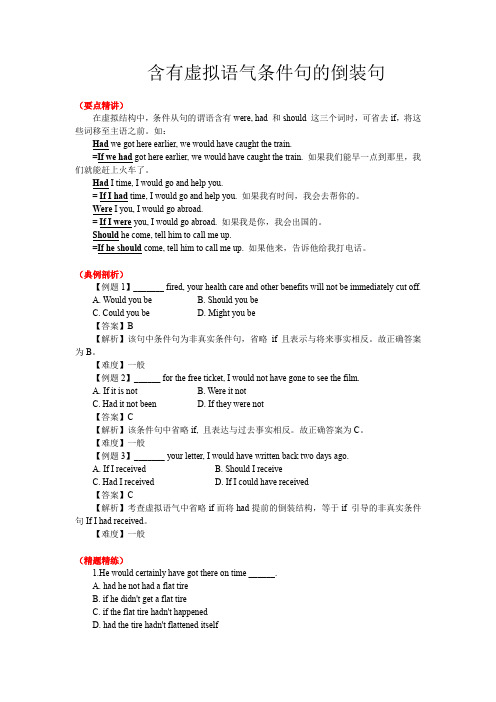
含有虚拟语气条件句的倒装句(要点精讲)在虚拟结构中,条件从句的谓语含有were, had 和should 这三个词时,可省去if,将这些词移至主语之前。
如:Had we got here earlier, we would have caught the train.=If we had got here earlier, we would have caught the train. 如果我们能早一点到那里,我们就能赶上火车了。
Had I time, I would go and help you.= If I had time, I would go and help you. 如果我有时间,我会去帮你的。
Were I you, I would go abroad.= If I were you, I would go abroad. 如果我是你,我会出国的。
Should he come, tell him to call me up.=If he should come, tell him to call me up. 如果他来,告诉他给我打电话。
(典例剖析)【例题1】_______ fired, your health care and other benefits will not be immediately cut off.A. Would you beB. Should you beC. Could you beD. Might you be【答案】B【解析】该句中条件句为非真实条件句,省略if且表示与将来事实相反。
故正确答案为B。
【难度】一般【例题2】______ for the free ticket, I would not have gone to see the film.A. If it is notB. Were it notC. Had it not beenD. If they were not【答案】C【解析】该条件句中省略if, 且表达与过去事实相反。
虚拟语气和倒装句讲解
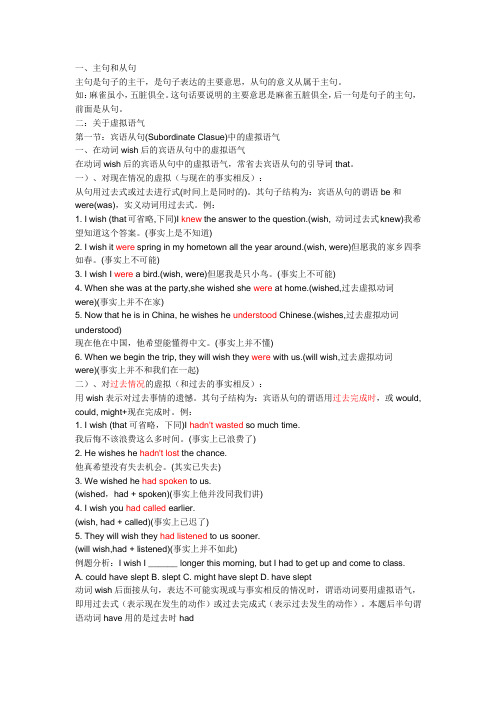
一、主句和从句主句是句子的主干,是句子表达的主要意思,从句的意义从属于主句。
如:麻雀虽小,五脏俱全。
这句话要说明的主要意思是麻雀五脏俱全,后一句是句子的主句,前面是从句。
二:关于虚拟语气第一节:宾语从句(Subordinate Clasue)中的虚拟语气一、在动词wish后的宾语从句中的虚拟语气在动词wish后的宾语从句中的虚拟语气,常省去宾语从句的引导词that。
一)、对现在情况的虚拟(与现在的事实相反):从句用过去式或过去进行式(时间上是同时的)。
其句子结构为:宾语从句的谓语be和were(was),实义动词用过去式。
例:1. I wish (that可省略,下同)I knew the answer to the question.(wish, 动词过去式knew)我希望知道这个答案。
(事实上是不知道)2. I wish it were spring in my hometown all the year around.(wish, were)但愿我的家乡四季如春。
(事实上不可能)3. I wish I were a bird.(wish, were)但愿我是只小鸟。
(事实上不可能)4. When she was at the party,she wished she were at home.(wished,过去虚拟动词were)(事实上并不在家)5. Now that he is in China, he wishes he understood Chinese.(wishes,过去虚拟动词understood)现在他在中国,他希望能懂得中文。
(事实上并不懂)6. When we begin the trip, they will wish they were with us.(will wish,过去虚拟动词were)(事实上并不和我们在一起)二)、对过去情况的虚拟(和过去的事实相反):用wish表示对过去事情的遗憾。
(完整版)虚拟语气倒装(讲解+练习)

虚拟语气有些条件句是可能实现的,称为真实条件句. 虚拟语气是动词的一种特殊形式,用来表达说话人的意愿.请求,设想,等未能或不可能实现的事实,或说话人看来实现可能性很小的情况.做这类题时首先要弄清楚虚拟语气的各种句型,即由if引导的虚拟条件句,省略if的倒装形式,可跟虚拟语气的宾语从句,同位语从句,表语从句的句型,以及表示祝愿或感叹的句子和由without, but for等介词引导的短语或句子.主要用法1). 主语从句,同位语从句中虚拟语气的用法.2). 宾语从句中虚拟语气的用法,尤其是wish 虚拟语气结构的用法.3). If条件句中虚拟语气的用法,应特别注意省略if的倒装结构是考试的重点.4). would rather(=wish)等结构中虚拟语气的用法.5). if only(如果。
就好了)结构中虚拟语气的用法.6). But, or, otherwise 等含蓄条件句的用法.7). It’s time (that)(早该。
)等结构中虚拟语气的用法.1. 虚拟语气在虚拟条件句中的运用(1) 虚拟语气现在时,用以表示与现在/将来事实相反的假设或现在实现可能性不大的情况.Eg. If I were a bird, I would fly to you.If it is not for their help, we shall be in a very difficult position.If it were not for their help, we should be in a very difficult position.If I had seen the film, I would…..(2) 虚拟语气过去式. 表示与过去事实完全相反的假设.Eg. If we had started earlier, we should not have missed the train.If she hadn’t been ill, she might have come.If she were not ill, she might come.◆书面语中,如果从句里含有should, had, were或其他助动词,则可将从属连词if省去,将助动词.情态动词.be或have放在句首形成部分倒装.Eg.Were he in your position,he’d do the same.If he Were in your position,he’d do the same.Had I had time, I would have done that yesterday.If I Had had time, I would have done that yesterday.If he Should (万一)come tomorrow, I should give him the dictionary.(3) 虚拟语气在某些从句中的应用.A)在(表现了说话人的愿望)wish, suggest, order, demand, propose,command, request, recommend, require, decide, insist, desire,urge等动词的宾语从句(should:应该) + 动词原形.以及would rather /sooner that后要用“ (should:应该) + 动词原形” 来表示愿望,建议,命令,要求等;由上述动词派生或转化的名词suggestion, proposal, plan,motion, recommendation, demand, order, desire, request,requirement, insistence, advice, decision , obligatory(义不容辞的,必须的同位语从句或表语从句中也要用相应的虚拟形式.Eg. His suggestion was that we (should) go at once.Wang insisted that we go at once.B)在It is/was + 某些形容词 + that (表现了说话人的愿望)从句的句型中,that从句中的谓语动词常用虚拟语气,即“should + 动词原形”这些形容词有:important, necessary, essential, imperative, natural, strange,advisable, desirable, possible, probable, astonishing,surprising, desired, suggested, requested, recommended,ordered, proposed, decided, moved等.C) “ should(居然/竟然) + 动词原形(或完成形式)” 可表示惊奇,遗憾,怀疑,不满等.ⅰ. 用于expect, believe, think, suspect 等动词的否定或疑问形式后的宾语从句中.Eg. I never expected that the new apartment should be so small.ⅱ. 用于“It is a pity, it is a shame, it is no wonder 等+ that”等结构后的主语从句中.Eg. It is a pity that he should be so careless.D) 在由for fear that, in case, lest 等引导的状语从句中,用“ should (万一)+ 动词原形” 表示“惟恐”的意思.Eg. He handled the instrument with care for fear that it should be damaged.E) 在“ It is (about/ high ) time + that (从句)(早就应该)” 中,谓语动词常用过去式表表示虚拟语气.Eg. It is high time that Chinese people learnt English.F) 在“as if/ as though”(似乎/好像) 引导的状语从句中,谓语动词与wish的宾语从句的虚拟形式相同.Eg. He w ork s with such enthusiasm as if he never knew fatigue. He speaks English as though he were an American.G) 在 look/sound/feel/ seem + as if / as though从句中,当表示真实情况时,用陈述语气; 否则,用虚拟语气.Eg.It seems as if they know each other. (真实情况)It seems as if they knew each other.It seems as though it were already spring. (虚拟语气)H) 用在if only(如果。
虚拟语气倒装

虚拟语气倒装当虚拟条件句中含有were,had,should,could等动词时,可以将if省略,然后将were,had,should,could 等词移至句首:1)If he should fail,he would kill himself.→Should he fail,he would kill himself.万一失败,他就会自杀。
2)If I were you,I would do it at once.→Were I you,I would do it at once.假若我是你,我就会马上做。
3)If I could do it,I would.→Could I do it,I would.要是我能做此事,我一定会做。
4)If he had seen you yesterday,he would have asked you about it.→Had he seen you yesterday,he would have asked you about it.他昨天要是看到了你,他就会问你这事了。
再看一些例句:1)Were they here now, they could help us.=If they were here now, they could help us.他们现在在的话,就会帮助我们了。
2)Had you come earlier, you would have met him.=If you had come earlier, you would have met him.你来得早一点,就碰到他了。
3)Should it rain, the crops would be saved.=Were it to rain, the crops would be saved.假如下雨,庄稼就有救了。
4)Were I(= If I were)in your place,I wouldn’t do it.5)Had you(= If you had)seen it,you would have believed.6)Were they to get married(= If they were to get married),the would not be happy.7)Should he come,tell him to ring me up.他要是来了,让他给我打个电话。
虚拟语气倒装(讲解+练习)
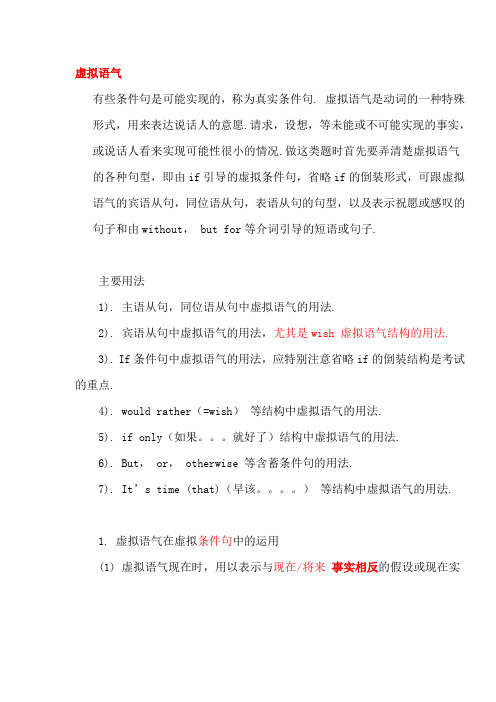
虚拟语气有些条件句是可能实现的,称为真实条件句. 虚拟语气是动词的一种特殊形式,用来表达说话人的意愿.请求,设想,等未能或不可能实现的事实,或说话人看来实现可能性很小的情况.做这类题时首先要弄清楚虚拟语气的各种句型,即由if引导的虚拟条件句,省略if的倒装形式,可跟虚拟语气的宾语从句,同位语从句,表语从句的句型,以及表示祝愿或感叹的句子和由without, but for等介词引导的短语或句子.主要用法1). 主语从句,同位语从句中虚拟语气的用法.2). 宾语从句中虚拟语气的用法,尤其是wish 虚拟语气结构的用法.3). If条件句中虚拟语气的用法,应特别注意省略if的倒装结构是考试的重点.4). would rather(=wish)等结构中虚拟语气的用法.5). if only(如果。
就好了)结构中虚拟语气的用法.6). But, or, otherwise 等含蓄条件句的用法.7). It’s time (that)(早该。
)等结构中虚拟语气的用法.1. 虚拟语气在虚拟条件句中的运用(1) 虚拟语气现在时,用以表示与现在/将来事实相反的假设或现在实现可能性不大的情况.Eg. If I were a bird, I would fly to you.If it is not for their help, we shall be in a very difficult position.If it were not for their help, we should be in a very difficult position.If I had seen the film, I would…..(2) 虚拟语气过去式. 表示与过去事实完全相反的假设.Eg. If we had started earlier, we should not have missed the train.If she hadn’t been ill, she might have come.If she were not ill, she might come.◆书面语中,如果从句里含有should, had, were或其他助动词,则可将从属连词if省去,将助动词.情态动词.be或have放在句首形成部分倒装.Eg.Were he in your position,he’d do the same.If he Were in your position,he’d do the same.Had I had time, I would have done that yesterday.If I Had had time, I would have done that yesterday.If he Should (万一)come tomorrow, I should give him the dictionary.(3) 虚拟语气在某些从句中的应用.A)在(表现了说话人的愿望)wish, suggest, order, demand, propose,command, request, recommend, require, decide, insist, desire,urge等动词的宾语从句(should:应该) + 动词原形.以及would rather /sooner that后要用“ (should:应该) + 动词原形” 来表示愿望,建议,命令,要求等;由上述动词派生或转化的名词suggestion, proposal, plan,motion, recommendation, demand, order, desire, request,requirement, insistence, advice, decision , obligatory(义不容辞的,必须的同位语从句或表语从句中也要用相应的虚拟形式.Eg. His suggestion was that we (should) go at once.Wang insisted that we go at once.B)在It is/was + 某些形容词 + that (表现了说话人的愿望)从句的句型中,that从句中的谓语动词常用虚拟语气,即“should + 动词原形”这些形容词有:important, necessary, essential, imperative, natural, strange,advisable, desirable, possible, probable, astonishing,surprising, desired, suggested, requested, recommended,ordered, proposed, decided, moved等.C) “ should(居然/竟然) + 动词原形(或完成形式)” 可表示惊奇,遗憾,怀疑,不满等.ⅰ. 用于expect, believe, think, suspect 等动词的否定或疑问形式后的宾语从句中.Eg. I never expected that the new apartment should be so small.ⅱ. 用于“It is a pity, it is a shame, it is no wonder 等+ that”等结构后的主语从句中.Eg. It is a pity that he should be so careless.D) 在由for fear that, in case, lest 等引导的状语从句中,用“ should (万一)+ 动词原形” 表示“惟恐”的意思.Eg. He handled the instrument with care for fear that it should be damaged.E) 在“ It is (about/ high ) time + that (从句)(早就应该)” 中,谓语动词常用过去式表表示虚拟语气.Eg. It is high time that Chinese people learnt English.F) 在“as if/ as though”(似乎/好像) 引导的状语从句中,谓语动词与wish的宾语从句的虚拟形式相同.Eg. He w ork s with such enthusiasm as if he never knew fatigue. He speaks English as though he were an American.G) 在 look/sound/feel/ seem + as if / as though从句中,当表示真实情况时,用陈述语气; 否则,用虚拟语气.Eg.It seems as if they know each other. (真实情况)It seems as if they knew each other.It seems as though it were already spring. (虚拟语气)H) 用在if only(如果。
情态动词的虚拟语气中,只有哪个可以倒装?
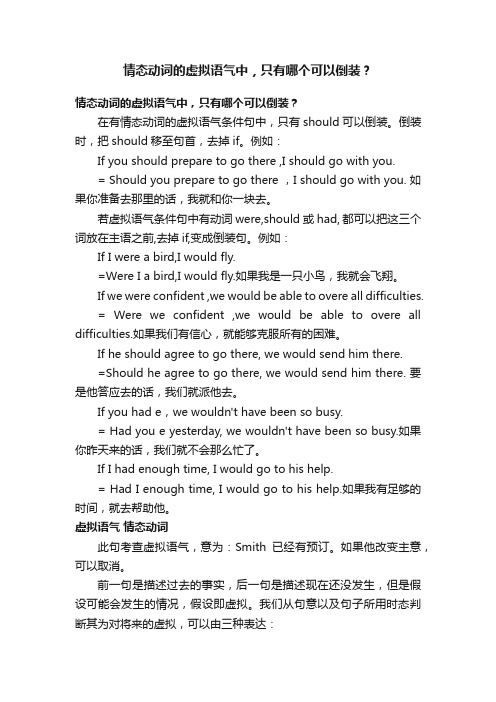
情态动词的虚拟语气中,只有哪个可以倒装?情态动词的虚拟语气中,只有哪个可以倒装?在有情态动词的虚拟语气条件句中,只有should可以倒装。
倒装时,把should移至句首,去掉if。
例如:If you should prepare to go there ,I should go with you.= Should you prepare to go there ,I should go with you. 如果你准备去那里的话,我就和你一块去。
若虚拟语气条件句中有动词were,should或had, 都可以把这三个词放在主语之前,去掉if,变成倒装句。
例如:If I were a bird,I would fly.=Were I a bird,I would fly.如果我是一只小鸟,我就会飞翔。
If we were confident ,we would be able to overe all difficulties.= Were we confident ,we would be able to overe all difficulties.如果我们有信心,就能够克服所有的困难。
If he should agree to go there, we would send him there.=Should he agree to go there, we would send him there. 要是他答应去的话,我们就派他去。
If you had e,we wouldn't have been so busy.= Had you e yesterday, we wouldn't have been so busy.如果你昨天来的话,我们就不会那么忙了。
If I had enough time, I would go to his help.= Had I enough time, I would go to his help.如果我有足够的时间,就去帮助他。
虚拟语气 倒装
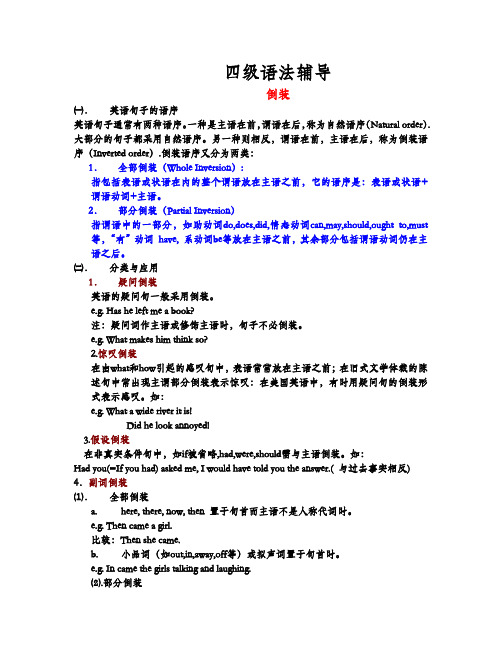
四级语法辅导倒装㈠.英语句子的语序英语句子通常有两种语序。
一种是主语在前,谓语在后,称为自然语序(Natural order).大部分的句子都采用自然语序。
另一种则相反,谓语在前,主语在后,称为倒装语序(Inverted order).倒装语序又分为两类:1.全部倒装(Whole Inversion):指包括表语或状语在内的整个谓语放在主语之前,它的语序是:表语或状语+谓语动词+主语。
2.部分倒装(Partial Inversion)指谓语中的一部分,如助动词do,does,did,情态动词can,may,should,ought to,must 等,“有”动词have, 系动词be等放在主语之前,其余部分包括谓语动词仍在主语之后。
㈡.分类与应用1.疑问倒装英语的疑问句一般采用倒装。
e.g. Has he left me a book?注:疑问词作主语或修饰主语时,句子不必倒装。
e.g. What makes him think so?2.惊叹倒装在由what和how引起的感叹句中,表语常常放在主语之前;在旧式文学体裁的陈述句中常出现主谓部分倒装表示惊叹:在美国英语中,有时用疑问句的倒装形式表示感叹。
如:e.g. What a wide river it is!Did he look annoyed!3.假设倒装在非真实条件句中,如if被省略,had,were,should需与主语倒装。
如:Had you(=If you had) asked me, I would have told you the answer.( 与过去事实相反) 4.副词倒装⑴.全部倒装a. here, there, now, then 置于句首而主语不是人称代词时。
e.g. Then came a girl.比较:Then she came.b. 小品词(如out,in,away,off等)或拟声词置于句首时。
e.g. In came the girls talking and laughing.⑵.部分倒装a. 方式副词或often, many a time频度副词置于句首时。
- 1、下载文档前请自行甄别文档内容的完整性,平台不提供额外的编辑、内容补充、找答案等附加服务。
- 2、"仅部分预览"的文档,不可在线预览部分如存在完整性等问题,可反馈申请退款(可完整预览的文档不适用该条件!)。
- 3、如文档侵犯您的权益,请联系客服反馈,我们会尽快为您处理(人工客服工作时间:9:00-18:30)。
当虚拟条件句中含有were,had,should,could等动词时,可以将if省略,然后将were,had,should,could 等词移至句首:
1. If he should fail,he would kill himself.
→Should he fail,he would kill himself.
万一失败,他就会自杀。
2. If I were you,I would do it at once.
→Were I you,I would do it at once.
假若我是你,我就会马上做。
3. If I could do it,I would.
→Could I do it,I would.
要是我能做此事,我一定会做。
4. If he had seen you yesterday,he would have asked you about it.
→Had he seen you yesterday,he would have asked you about it.
他昨天要是看到了你,他就会问你这事了。
顺便说一句,以上移至句首的 had不一定是助动词,如果是实义动词也可倒装:
If he had money,he would buy a car.
→Had he money,he would buy a car.
他要是有钱,他就会买一辆小车。
